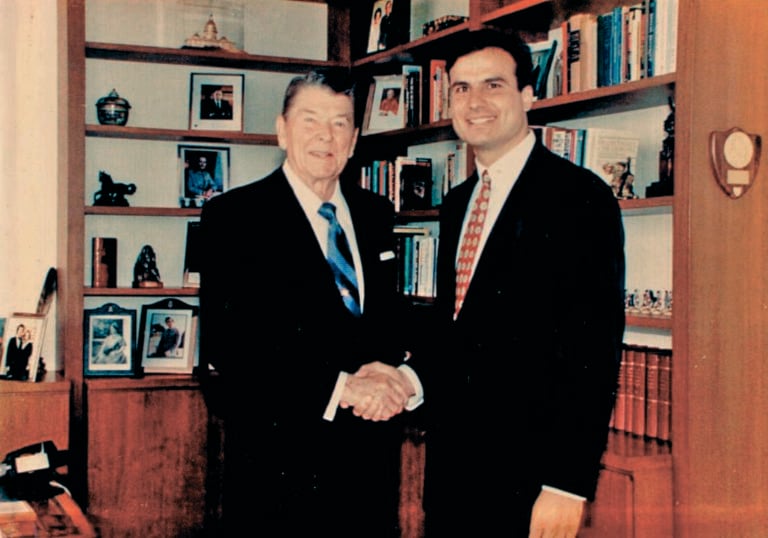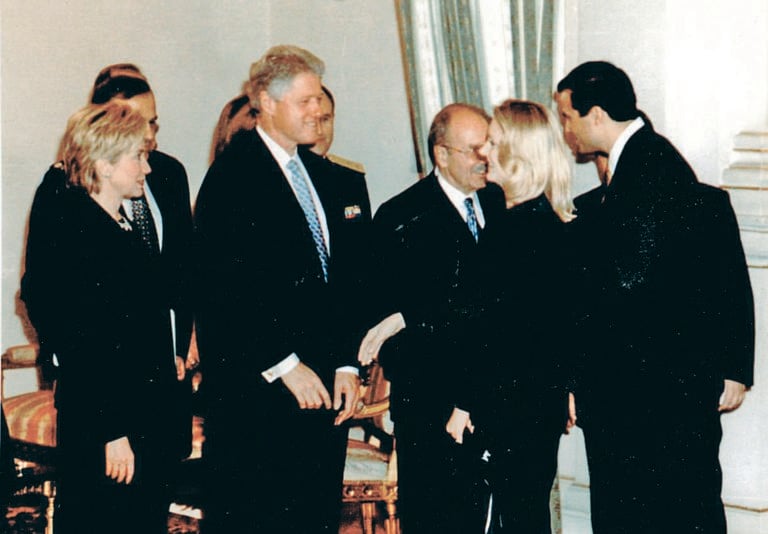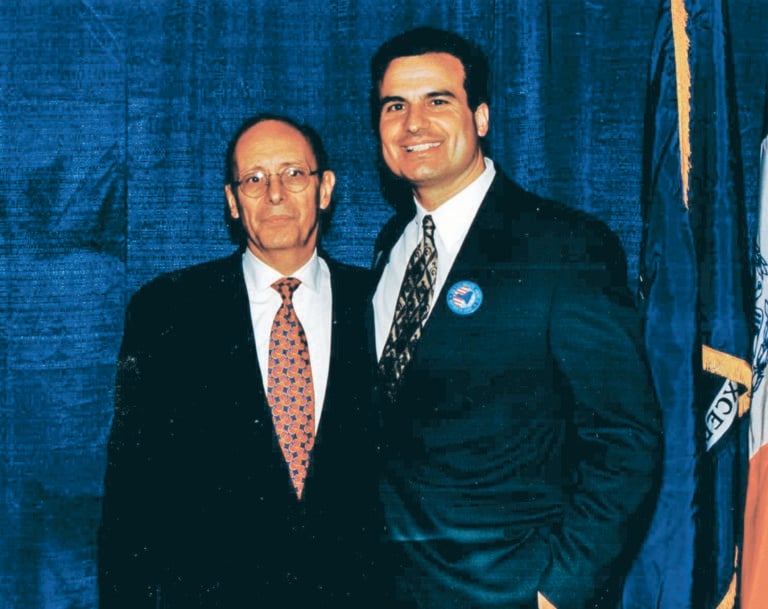John Sitilides is a geopolitical strategist, based in Washington DC, an insider. The U.S. Department of State is one of his key clients. He talks fast but with diamond sharp precision, no word is superfluous. Mr Sitilides has provided advice to Republican and Democratic administrations on Asia, South East Europe and the Middle East since the early 1990s. Under a U.S. government contract, he also chairs since 2006 the Advanced Area Studies program for Southern Europe (now Greece, Turkey and Cyprus) at the Foreign Service Institute, the State Department’s professional development academy and strategic adviser for American foreign policy professionals. He was the Chair of the prestigious Woodrow Wilson Center Southeast Europe Project from 2006 to 2011.
The son of immigrants
“I am the first American in my entire family, an honour that I hold with great distinction,” he declares over the phone.
“My father is of Greek-Pontian descent, his family were forced to move to Kastoria from Asia Minor (Turkey) during the Population Exchange in the 1920s.”
The Great Catastrophe – part of which includes the Pontic genocide – between 1913 and 1923 was instigated by the Ottoman government and was characterised by massacres, forced deportations, death marches, arbitrary execution, burning of villages and cities, rapes, crucifixions and the destruction of Christian cultural, historical, and religious monuments.
Yet, Mr Sitilides is concerned though that his “Pontians over-delve on the genocide.”
“We lose the importance of our 3000-year-old civilisation by focusing only on the last 100 years, Pontians had great emperors, philosophers and artists in Greek, Roman and Byzantine periods.”
Mr Sitilides’ parents met in 1960, settled in Jersey City, where he was born. In 1967, they moved to Astoria, New York’s ‘Greek Town’ where his mother still lives in the house Mr Sitilides grew up in.
He then went on to get his Bachelor in Political Science from Queens College and Master’s Degree in International and Public Affairs from the Columbia University School of International and Public Affairs.
“When I go back to Astoria, [from Washington DC], I sleep in the same bedroom I grew up in,” he laughs.
READ MORE: Vrasidas’ Melancholia and Greek Politics

Just the facts please
Mr Sitilides began working as a policy and communication adviser for New York Republican Senator, Alfonse Marcello from 1985 to 1993. He then moved to Sacramento, to work with AKT Development Corporation, a prominent real estate developer of Greek-American background.
“He needed government affairs muscle to deal with the regulatory war that was being waged on private property owners in the western states.”
The Sacramento developer and Mr Sitilides also shared a deep interest in South Eastern Europe, particularly as the Balkan Wars raged. They set up the Western Policy Centre, a “purely a fact based institute”, which advised the Department of State in DC on disputes in the Aegean Sea, Balkans, Cyprus, Turkey and NATO as a way of “bringing stability and peace” in the Eastern Mediterranean.
“We tried to bring the full range of factual perspectives to policy planners, across both parties, to media and to think tanks in DC, and not as pro-Serbian or anti-Bosniak, but simply as the fact direct us.”
He blames the Serbian government for “failing to communicate to Washington and the American people the range of complex factors” playing out in the Balkans at that time.
“The Serbians were demonised, and the Bosniaks were held out as paragons of virtue – victims of the traitorous Serbians, and the Croatians stood somewhere in the middle.”
America’s intervention in the Balkan Wars was based on the “bipartisan notion of liberal intervention from an American perspective that emerged in the immediate post-Cold War period,” Mr Sitilides says.
“Western Europe was unable to deal with the atrocities of hundreds of thousands of Bosniaks being killed while most of Europe was on the side of Croatian Catholics against the Serbian Orthodox.”
“All three sides had committed major atrocities.”
Mr Sitilides says it’s “somewhat comical” when looking back the number one interest for US foreign affairs in the 1990s, were the Balkans.
“That is until the September 11, terror attacks woke us up to the fact that radical Islamists declared war on the West and the United States.”

A new Mediterranean bonhomie
He welcomes the bonhomie between Greece, Cyprus and Israel, which he views as a relationship largely premised on “economic and defence cooperation”.
He tributes former conservative prime minister Constantine Mitsotakis as the first to “establish formal diplomatic relations with Israel”, at the same time, he praises left-wing former prime minister Alexis Tsipras for “going even further”.
“Tsipras was a visionary in forging a different foreign policy,” Mr Stilidis said.
“He surprised many observers with the foreign policies he adopted, which are contrary to those of traditional radical left parties in Greece over the decades.”
Greece, Cyprus, Israel, and now, Egypt, are eyeing out the immense, and appropriately named Goliath gas reserves in the South East Mediterranean. The new cooperation between Greece and Israel has significant “capital returns” in DC, “where both Israel and Greece, are beloved countries,” Mr Sitilides adds.
“When they [Israel and Greece] were at odds with one another, it was difficult to forge the sort of coalitions we wanted in Washington, it is at the heart of many issues that we are working on in the region, from a Washington perspective.”
Australia caught between a trade wars Australia is like a kid caught between bickering parents, as America and China clash over economic and strategic issues.
China is our largest trading partner in terms of both imports and exports and Mandarin became the biggest language spoken at home after English, according to the 2016 Census.
Australia’s Prime Minister Scott Morrison recently warned that the tension between the US and China risked making Australia “collateral” damage. Mr Sitilides wants assuage any fears Australia may have and says he wants China to prosper and grow by the rules, the rules as set by “the World Trade Organisation (WTO) rules which China had legally bound itself to adhere to when it was granted membership in 2001.”
“It is in no one’s interest that any of America’s allies become anything but stronger and more prosperous as a result of the China-US trade talks,” he said.
READ MORE: Make sure your fingerprints aren’t all over it

He cautions though, “It is also not in America’s, or Australia’s interests that China be permitted to continue to operate in untrammelled fashion and in utter violation of WTO rules.”
The ‘Asian Century’ became a common refrain in Australia’s policy corridors, boardrooms and academies and Labor and Liberal governments fell over each in their attempt to get closer to China.
President Trump’s ‘America First’ mantra though, is running up against a more muscular China led by Xi Jiping, the President for life, keen to assert China’s status as an economic and military superpower.
“It is in Australia’s long-term disadvantage if China is allowed to get away with impunity, as it has been permitted to do so over the last eighteen years. “Frankly, the U.S. and the West has been asleep at wheel when it comes to China”.
The allegations levelled towards China include “forced technology transfers when companies to do business in China; massive state subsidises for state owned enterprises; dumping of products and services in other countries and currency manipulation. The foreign policy architect also points to China’s ‘military activities’ that as he says are “diminishing America’s ability to maintain free and open shipping lanes and an island continent like Australia is completely dependent on.”
READ MORE: Energy and the European perspective: EU leadership vital as climate crisis intensifies
China’s investments in Greece, Africa, and Pakistan and across the globe, are tangible so how would we stop China’s flouting of the WTO rules without limiting its economic and political agency?
Mr Sitilides says that is the greatest strategic global question for the next ten to fifteen years.
China has reached out to developing nations offering “very significant credit terms in opaque agreements, with much corruption”.
He paints a dark picture of underdeveloped nations across Africa, South Asia, Central Asia accepting cumbersome loans from Chinese banks, then use Chinese products and goods, and are forced to import Chinese workers.
“In the end there is no benefit at all to the people and their nations, except for local corrupt officials in those nations,” Mr Sitilides says.
“What will happen if Sri Lanka has to surrender a 99-year lease to one of its ports to China, or when Zambia is concerned it will lose one of its airports to China, when Pakistan is concerned it will lose a seaport to China?” Mr Sitilides asks rhetorically.
He does not blame Chinese for “moving in with significant financing to establish these mini facilities on a global scale throughout Africa, Eurasia, Europe, Latin America and Pacific, they stepped into the vacuum while the U.S. and the West were asleep.
In Europe, China has significant stakes in over 14 small and major ports. Greece’s Piraeus Port is under a Chinese lease and it is more productive now than it has been since ever.
India steps in like the Bollywood hero
Mr Sitilides encourages the ‘quadrilateral alliance’ comprising America, Japan, India and Australia.
“These allies working together are a check against China’s overly ambitious designs across the Indo-Pacific region.”
China is moving more and more aggressively into the Indian Ocean region from the Straights of Malacca to Persian Gulf and the Red Sea.
Mr Sitilides says that China’s ‘String of Pearls’ maritime facilities, pose a strategic threat to India.
He adds, “India is one of the great investment and growth opportunities of the 21st Century”.
India’s commitment to “social, economic and political liberalisation though is essential.”
Rapid, social and economic change, which the Chinese achieved since the 1980s, is not a guarantee for India the world’s largest democracy.
One of most important social reforms would be to dispense with the, “caste systems,” Mr Sitilides states.
Regardless of rapid the rise of India’s new middle class over the last decade, the gap between poverty and wealth is still too vast.
It needs to be said that the wily BJP Prime Minister Narendra Modi and President Trump are politically enamoured with each other. Both are nationalists and see themselves as mavericks disrupting what they see as entrenched ‘elites’. A strange President sure, but it should be no surprise Sitilides admits Donald Trump is not “your typical American president, or typical Western political leader –that is why sixty-three million Americans voted for him.”
The mercurial President Trump concerns many of America’s allies, but says Sitilides, “there should be no surprises.”
“President Trump said that if he is elected as President he will withdraw the United States from the Joint Comprehensive Plan of Action (JCPOA) on Iran, because he believed it was defective agreement.
“The President said that he would withdraw the U.S. from the Paris Climate Agreement which he saw as worthless – the US would use technology to reduce emissions.”
READ MORE: What can America expect from the new Greek Government’s foreign policy?
The U.S. has walked back from various multilateral forums. Last week, Donald Trump slapped tariffs on European steel and aluminium siting ‘national security reasons’. Yet, these Europeans fought the Nazis side-by-side with the Americans on the Normandy landing in World War II.
Even Australia’s former Prime Minister Malcolm Turnbull got an earful over the phone by the newly elected President Trump over a refugee swap deal agreed to by President Obama, that the President didn’t like. Mr Sitilides says Trump should be viewed as the “CEO of a family company, who is accustomed to dealing with situations in a direct manner, and yes, in an unorthodox way”.
He admits that it was “unfortunate because Australia is one of the most vital allies of the U.S.”
Mr Sitilides fires back though, when pushed on why China should be ‘reigned in’ while the leader of the free world now uses punitive tariffs against America’s allies.
“We must draw clear distinctions here. China has for decades been engaged in massive and persistent theft of international property rights, it coerces technology transfers when companies want to do business in China, and massively subsidises state owned enterprises. China is a currency manipulator involved in a debt for sovereignty projects through its belt-road initiative around the world.
“The U.S. does none of these things,” says Mr Sitilides emphatically.
“The US does not operate on a global trade and commerce perspective the way China does which should be held accountable for these egregious violations of WTO rules.
Trump: Machiavellian or just very thin-skinned?
“Racism it’s not!” protests Mr Sitilides when asked if he saw President Donald Trump’s Twitter missive against the ‘Squad’ of four freshmen congresswomen as racist.
Mr Trump called on the four outspoken freshmen congresswomen to “go back and help fix the totally broken and crime infested places from which they came. Then come back and show us how….”
As the son of migrants, Mr Sitilides, like many of us, may have also ben told to ‘go back home’ in the past.
Ilhan Omar of Minnesota, (the only one not born in the U.S.), Alexandria Ocasio-Cortez of New York, Rashida Tlaib of Michigan and Ayanna Pressley of Massachusetts have become a major focus of criticism from Trump and Republicans, as well as moderate Democrats.
“You can argue whether that is a presidential statement to make, but we are not talking about a conventional politician,” says Mr Sitilides.
The ‘woke’ congresswomen have also clashed with Democrat House Speaker Nancy Pelosi, calling her ‘racist’ in an extraordinary and unprecedented attack in the House.
“Rashida Tlaib has called President Trump a mothef-cker publicly and congresswoman Ortez labelled him a racist and says he’s is running concentration camps on the U.S. Mexico border,” Mr Sitilides says in an attempt to provide context. He believes that these congresswomen are actually hurting the Democratic Party, through their actions more than Trump.
“These four members have no loyalty to party leaders in House, and President Trump is successful in tarring the Democratic Party as undisciplined, steered by four extremists in the House of Representatives – this can be detrimental to the Democratic Presidential nominee for 2020.”
Mr Sitilides leans towards the view that, “If your enemies are shooting each other you leave them alone.” And he hints to Trump’s reactiveness, “If Trump is punched or criticised he comes back hard.”
“These four congresswomen have exploited social media and identity politics to make a name for themselves, they’ve stuck their necks out but do not deal with any of criticism that comes from the President,” opines Mr Sitilides.
Mr Trump and the four congresswomen, seem to mirror each other in their use of social media, casual insult and over-exaggeration when pitching to their respective audiences. The difference being that Trump is the President, augmenting his base, while the Squad is alienating many traditional Democrat voters in the lead up to he 2020 election.
Mr Trump is “unconventional and unorthodox,” according to Mr Sitilides. Importantly, he has been able to “master the entertainment industry in the social media era – and he has not been behind the polls since he announced his candidate in 2016.”
READ MORE: Greek American Antonis H. Diamataris the new Deputy Minister for Expatriate Greeks
Longing for the centre
It is difficult to remember a more febrile, divided and partisan period in U.S. since the Civil Rights Movement and the anti-Vietnam War. The disruptions now though seem to be mainly social media, theatrics. Substantial political rhetoric, charisma, vision, and bold strategy seem absent in Trump’s world. Trump may win the next election.
He may be successful in tarring the Democrats as chaotic and undisciplined, and run by university style woke radicals, but at what cost to what Former Prime minister Paul Keating once called ‘the atmospherics?’
Mr Sitilides’ fact-based approach to policy advice is evidence that the Republic is resilient and democracy does work. People like Stilides sustain the core bipartisan foreign affairs architecture of America, regardless of the impulses any President may have. And it seems President Trump is very prone to impulsive reactions.
As far as China, Canberra would do well to limit the recent emergence of distrust of Chinese influence in our body politic, perceived and real. We could instead harness Prime Minster Paul Keating’s advice and use our knowledge of China, to be the valued conduit between China and America, the benefit of both great powers. As a middle ranking western nation in the Asia Pacific region, we may assist China to improve its global behaviour, without limiting its aspirations for its people, and without its leadership loosing face. Simple, Australia needs China and America.









